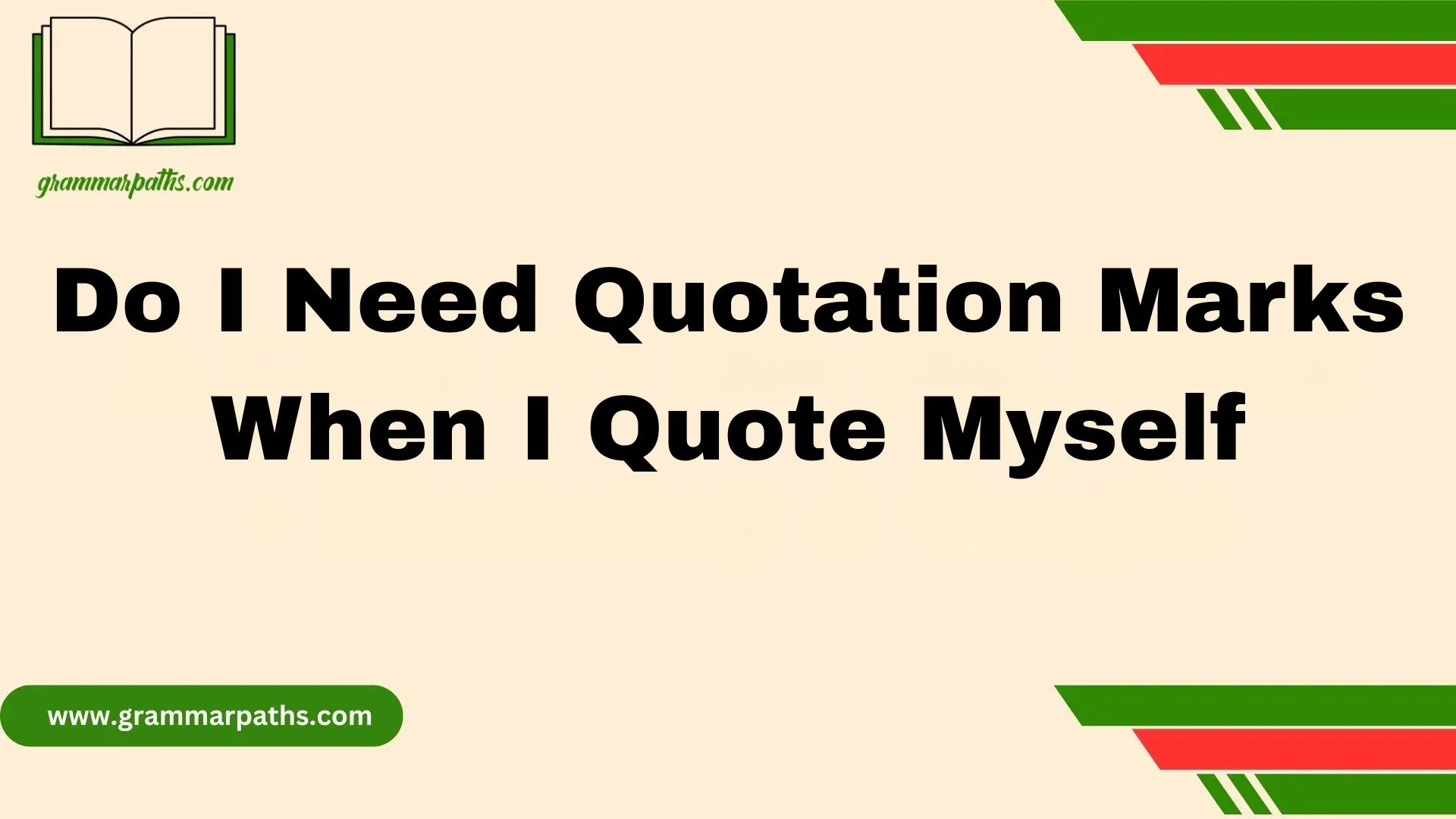As a writer, I often revisit an earlier post and rediscover a phrase that still resonates. In those moments, I wonder, “Do I Need Quotation Marks When I Quote Myself?” If I’m writing for a digital audience, using quotation marks might feel unnecessary unless the context demands clarity. However, when the writing is more formal or academic, quoting your own words is generally expected. Whether you paraphrase or quote directly depends on the role of your content, and how you want the message to come across.
There was a time I found myself returning to a topic I had covered in the past. The tone had shifted, and my voice had grown. Referencing my old work helped frame the message in a much stronger way. It didn’t feel like a repeat—more like a thoughtful transformation. It actually showed depth, insight, and perspectives I hadn’t explored before. What matters is knowing which version—a direct quote or paraphrase—works best. Follow a clear guide, and don’t be afraid to reflect on your own writing. When used well, self-quotes become creative communication tools, not just reused lines.
What Is Self-Quotation?
Self-quotation means repeating or referencing something you’ve said or written before, whether in a published work, recorded speech, or even a previous blog post or comment.
Unlike quoting others, self-quotation comes with some gray areas, especially regarding formatting and citation. Here’s how it works:
Common Examples of Self-Quotation
- Repeating a memorable sentence from your previous blog
- Citing a statistic from your own research paper
- Referencing something you said in a podcast
- Quoting a tweet or social media caption you posted earlier
In these cases, you’re not only borrowing your own words—you’re also framing them for a new audience, which means the rules of writing and clarity still apply.
When Do You Need Quotation Marks to Quote Yourself?
Let’s break it down:
Use Quotation Marks When:
- You’re repeating exact wording from a previous work
- You want to emphasize the phrasing of a past quote
- You’re referencing yourself in a published or professional context (e.g., academic papers, articles, or blog posts)
“We teach best what we most need to learn.”
—If you said that in a book you wrote, and now you’re quoting it again, yes—you should use quotation marks.
Don’t Use Quotation Marks When:
- You’re paraphrasing your past idea or rewording it
- The writing is informal, like in a personal journal or casual email
- You’re discussing an idea or argument, not the exact phrasing
Rule of thumb: If you’re reusing your exact words, use quotation marks. If you’re simply revisiting an idea or argument, don’t.
Quoting Yourself in Different Contexts
Academic & Research Writing
In scholarly contexts, self-quotation is handled carefully. The goal is to maintain transparency, give proper attribution, and avoid self-plagiarism.
Style Guide Rules
| Style Guide | Rule for Self-Quotation | Example |
| APA (7th ed.) | Cite your previous work as you would cite any source | (Smith, 2020, p. 14) |
| MLA (9th ed.) | Include full citation in works cited list | Smith, John. Title. Publisher, 2020. |
| Chicago | Use either Notes & Bibliography or Author-Date | Smith 2020, 14. |
Important: Even though you are the author, reusing your past writing without citation in academic work is considered self-plagiarism.
Creative Writing and Literature
Writers often quote their own characters or revisit past phrases. This is completely acceptable, especially when used to:
- Create continuity between books
- Reinforce a recurring theme
- Build a deeper connection with readers
Example:
In The Catcher in the Rye, J.D. Salinger repeats phrases and internal monologues to reflect Holden Caulfield’s emotional cycles.
Digital Content and Social Media
If you’re writing blogs, newsletters, or even Instagram captions, quoting yourself is a natural tool. Here’s how to do it right:
When to Use Quotation Marks
- Repeating your viral tweet or caption
- Quoting a past blog line
- Pulling a sentence from your YouTube script
When You Can Skip Quotation Marks
- You’re summarizing your past idea
- You’re embedding your quote as a visual (like a screenshot)
Practical Scenarios: When You Might Quote Yourself
Here’s when quoting yourself can add clarity or punch to your writing:
Use Self-Quotation If You’re:
- Referencing a catchy line from a past article
- Repeating a key finding from your own research
- Embedding a memorable quote from a previous podcast or interview
- Quoting a branded slogan or tagline
- Creating a callback to past content for narrative effect
Example:
“Consistency compounds.”
That’s something I wrote last year—and I still believe it’s true.
Real-life Use Case (Blog to Tweet):
Blog line: “Burnout isn’t a badge of honor—it’s a warning sign.”
New tweet: As I said in last year’s burnout post, “Burnout isn’t a badge of honor—it’s a warning sign.”
How to Format Self-Quotations Correctly
Formatting helps readers identify and interpret your self-quote quickly.
Basic Rules
- Short quotes (under 40 words): Use quotation marks within the paragraph
- Long quotes (40+ words): Use a block quote format—no quotation marks
- Add citation if the original source is formal or previously published
Formatting Table
| Quote Length | Format | Example |
| Short (<40 words) | Quotation marks | “I built my brand on consistency and connection.” |
| Long (40+ words) | Block quote | > My brand voice is simple: Speak clearly. Show up consistently. Serve generously. |
Tools That Help
- Grammarly: Flag unclear quotations or grammar issues
- Citation Machine: For APA/MLA citations
- Hemingway App: Test quote clarity and sentence readability
Self-Referencing vs. Self-Quotation
Though they sound similar, they aren’t the same:
| Term | Definition | Example |
| Self-Quotation | Using your exact words from a previous work | “I believe simplicity sells.” |
| Self-Referencing | Referring to your earlier work as a source | (See my article: “Why Simplicity Sells”) |
Tip: You can reference yourself without quoting, and vice versa. Use both when necessary.
Common Mistakes to Avoid
Here are mistakes writers often make when quoting themselves—and how to avoid them:
- Forgetting quotation marks for exact phrases
- Not citing a formal publication
- Overusing quotes from yourself, making the tone sound arrogant
- Quoting yourself in third person—confusing for readers
- Reusing content without adding value (this could hurt SEO)
Legal & Copyright Considerations
Even if you wrote something, you may not always own the rights to quote it.
Ownership Rules
| Situation | Who Owns the Quote? |
| You self-published a blog | You do |
| You wrote for a client as a freelancer | They likely do (check contract) |
| You published with a publisher | Check your rights; they may own distribution rights |
When You Need Permission
- Your work is behind a paywall
- The quote was used in a co-authored project
- You signed away rights during a publishing deal
Tip: Always review your agreements before reusing content from work-for-hire or ghostwritten projects.
Best Practices for Quoting Yourself
Want to sound confident, not self-absorbed? Follow these best practices:
- Use quotes that add value to the new content
- Keep it short and memorable
- Provide context if needed—don’t assume readers remember the original
- Link or cite the original source when applicable
- Don’t overdo it—quote yourself sparingly
Case Studies: Real Examples of Effective Self-Quotation
Case 1: Author Reinforcing a Theme
Brené Brown often references key phrases like “vulnerability is not weakness” across her books, TED talks, and social content. Each time, she builds upon the idea with new context.
Case 2: Blogger Creating a Callback
Digital marketing expert Ann Handley quoted her own 2017 blog post in a 2022 email newsletter, reinforcing her point about “slow marketing.”
Case 3: Researcher Reiterating a Finding
Dr. Adam Grant often quotes data from his past studies while writing articles or giving talks—always properly cited.
The Role of Clarity and Voice in Self-Quoting
If you’re going to quote yourself, make sure it:
- Sounds like you
- Fits your tone and audience
- Supports your current message
Don’t just quote yourself because it sounds good—quote yourself when it helps the reader.
Conclusion
Quoting yourself might feel unusual at first, but when used with clarity and purpose, it becomes a powerful way to show your growth as a writer. Whether you’re writing for a digital blog or a formal academic paper, knowing when and how to use quotation marks or a paraphrased version of your words adds depth and originality to your content. Just follow a simple guide, reflect on your message, and use self-quotes as a creative tool—not just to repeat, but to show your evolving voice and insight.
Frequently Asked Questions
1. Do I need quotation marks when I quote myself in a blog post?
Not always. In digital writing, you can paraphrase or directly quote without quotation marks, as long as it’s clear you’re referencing yourself.
2. Is it acceptable to quote myself in academic writing?
Yes, but you must use quotation marks and proper citation if you’re reusing exact phrases from previous published work.
3. How do I decide between quoting and paraphrasing?
It depends on your role, audience, and the tone of the piece. If the original phrase has impact, quote it. Otherwise, a paraphrased version may fit better.
4. Are self-quotes considered redundant?
Not if used thoughtfully. They can show your growth, support your message, and add depth when presented in the right context.
5. Can self-quoting help my writing style?
Definitely. It encourages reflection, helps you frame your thoughts, and shows your evolving voice over time.
Bonus: Self-Quotation Style Guide Cheat Sheet
| Situation | Use Quotation Marks? | Cite It? |
| Referencing a past blog idea | No | No |
| Quoting a sentence from your article | Yes | Link or cite |
| Academic paper reuse | Yes | Yes (APA/MLA/Chicago) |
| Tweet or post callback | Yes (or embed) | Optional |
| Spoken words in podcast | Yes | Clarify context |

Grace Marie is the dedicated writer behind GrammarPaths.com, where she shares her passion for English grammar, idioms, and writing mastery. With a strong background in language studies and years of experience helping learners improve their communication skills, Grace creates clear, practical, and engaging content that makes English easy to understand.












